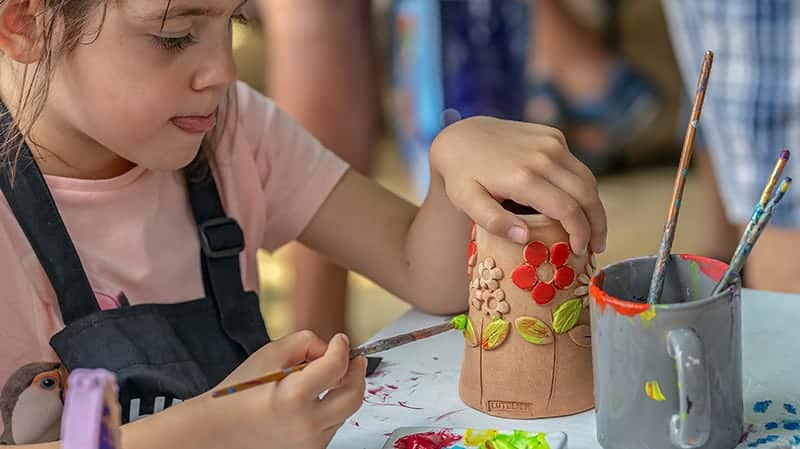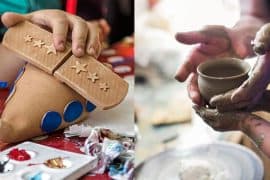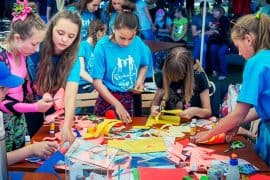If your child enjoys art, likes art classes, and is ready for more intensive or frequent art experiences, art camp may be a great next step! Art camps for kids can provide opportunities to explore a variety of art techniques, make new friends and have fun in a safe and enriching environment.
What Type Of Camp Are You Looking For?

Art camp can mean several different kinds of experiences. There are:
• Daily after school programs
• Full day camps during Christmas or spring breaks
• Day camps during the summer (weekend, week-long or summer-long)
• Overnight camps
Daily After School Art Programs
Most daily after school camps operate similar to childcare, providing children with activities, snacks and even homework help (for more see our art classes for kids page). They often operate for a few hours a day, typically ending around dinner time.
Full Day Childrens Art Camps
Full day camps during the school year are designed to give children enrichment and care during school breaks when parents might be at work. They are often open during typical daytime working hours, while day camps during the summer might start early in the morning and extend through early evening hours.
Summer day camps might also involve field trips, outdoor activities or other traditional camp experiences, minus the sleeping in cabins or tents.
When looking for a great after school or day camp, you will want to make sure that the hours meet your needs. If you need childcare until 7 PM every evening, for example, a camp with a mandatory 5 PM pick-up time would not be a good match.
Overnight Kids Art Camps
Overnight camps, however, are what might come to mind when you think of the typical summer camp. They can be more immersive experiences, with hours spent each day focused on art. However, campers also typically eat all meals at the camp, sleep in cabins or tents and participate in other activities like swimming, hiking, bonfires and sports.
For overnight camps, and even for summer day camps, ask about whether the camp is accredited or licensed. In many states, camps that care for children more than a couple hours a week need to be licensed and staff need to meet strict background check guidelines.
Pay Attention To Staffing

Your child will spend a considerable amount of time at camp – far more than in a weekly class. This makes camp staffing especially important. There are several important considerations when looking at camp staff that may not be as important for an art party or class:
• What qualifications does the camp director have? Is he or she a professional artist? Do they have experience running a camp?
• Where are counselors and staff members recruited from? Do they have a large number of former campers returning as staff (happy campers often want to give back to their camp by becoming a counselor when they are older!)?
• Do staff have the appropriate background checks?
• What training do staff members receive? Are they first aid/CPR certified?

Of course, you also want to make sure that the staff members and counselors are engaging and seem to love what they do. Camp can be long for both the staff and kids, but energetic and engaging counselors are essential in helping your child have an experience they’ll happily remember. Campers can feel if their counselors love being there – a great camp counselor’s energy and enthusiasm are contagious! Even the most reluctant camper is more willing to try new activities if the counselor is passionate and encouraging.
If the camp is an overnight camp, make sure the counselors have a plan for helping homesick children too!
Look At Camp Schedules And Activities
Unless your child is attending an intensive specialized camp, they will likely not want to sit for hours at a time doing art every day. Great camps have a variety of activities designed to stimulate the mind and get the body moving. The longer the camp, the more activity variety the camp should have. While an after school camp might only have time for a craft project, a snack, a brief recess and maybe a story, an overnight camp should have a good mixture of art activities, socialization opportunities, structured outdoor activities and recreational opportunities.
Camps should have plans for inclement weather too, especially if those camps have outdoor activities. Nothing is less fun for a child than to be excited for a fun day outdoors only to be stuck indoors because of rain with nothing to do. A well-run camp will always have a backup plan for bad weather!
Safety First! – Check Out Emergency Procedures

Unfortunately, even at the best-run camps, accidents and emergencies happen.
If the camp offers outdoor activities or field trips, make sure to ask about safety and procedures for leaving the main building. If the camp has a pool, check to make sure there are lifeguards available. If campers attend field trips, ask about how children are transported.
If the camp is a day camp or overnight camp, ask about procedures for administering medications or applying sunscreens, medical care in case of an illness or injury or how your child’s special need or medical condition will be accommodated. If your child requires an inhaler or epi pen, ask about their policy for self-carry and self-administration as well! It is a whole lot easier to feel comfortable sending your child to camp when you know that the camp can keep your little one safe in any emergency!
Art camps for kids can be exciting and provide great learning experiences. With careful planning, you’ll find one that’s not only perfect for your young artist, but gives them an experience they’ll always remember!
Checklist For Choosing The Best Art Camp For Kids
Here’s a handy checklist for choosing a great kid’s art camp:
✓ Is the camp a day camp or overnight camp?
✓ What age range does the camp cover?
✓ What is the cost of the camp?
✓ What is the camper to counselor ratio?
✓ Can the camp accommodate my child’s special need or disability?
✓ What non-art activities are available for campers?
✓ What plans are in place for inclement weather?
✓ What qualifications does the camp director have?
✓ What qualifications do the camp counselors have?
✓ What training do camp staff receive?
✓ Are the counselors, director and staff encouraging, engaging and patient?
✓ Can children choose their roommates (for overnight camp)?
✓ Are camp hours/days flexible?
✓ Are meals provided (and if so, are food allergies accommodated)?
✓ How can parents communicate with their students while at camp?
✓ Is the camp accredited or licensed by any local, state or national organizations?
✓ What is the typical day like at camp? Are there a variety of activities? Good art camps for kids should offer a good mix.
✓ Is there space for outdoor exploration and play?
✓ How does the camp handle behavior/discipline issues?
✓ Are there procedures for administering medication/sunscreens?
✓ What types of art will my child get to explore? What types of projects will they bring home?
✓ Is the camp focused on refining a specific art skill or exploring a variety of mediums?
✓ How is creativity encouraged at this camp?
✓ Are there opportunities for my child to take on leadership roles over time (for annual camps)?
✓ Is the camp location convenient for drop-off and pick-up?





Comments are closed.